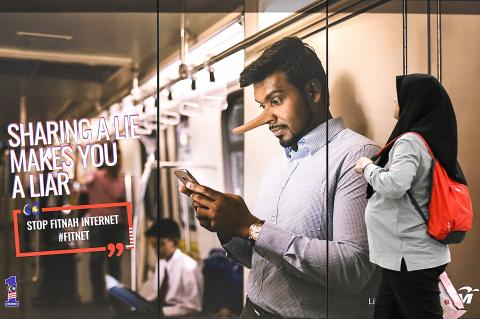The Malaysian government yesterday proposed new legislation to outlaw fake news with a 10-year jail term for offenders, a move slammed by critics as a draconian bid to crack down on dissent ahead of a general election.
Malaysian Prime Minister Najib Razak has been dogged by a multibillion-dollar corruption scandal involving an indebted state fund, and rights activists fear that the new law could be used to criminalize news reports and critical opinions on government misconduct. A general election must be held by August, but is widely expected in the next few weeks.
The anti-fake news bill, which must be approved by the Malaysian parliament, calls for penalizing those who create, offer, circulate, print or publish fake news or publications containing fake news with a 10-year jail term, a fine of up to 500,000 ringgit (US$128,240) or both.

Photo: AFP
The bill defines fake news as “any news, information, data and reports which is, or are, wholly or partly false whether in the form of features, visuals or audio recordings or in any other form capable of suggesting words or ideas.”
It covers all mediums and extends even to foreigners outside the country if Malaysia is affected.
“This is an attack on the press and an attempt to instill fear among the [people]” before the general election, opposition lawmaker Ong Kian Ming tweeted.
Government officials say the law is needed to protect public harmony and national security.
Officials have accused the opposition coalition of using fake news as a key weapon to win votes and warned that any news on Malaysia’s indebted state investment fund 1Malaysia Development Bhd (1MDB) that had not been verified by the government is fake.
The US and several other countries are investigating allegations of cross-border embezzlement and money laundering at 1MDB, which was set up and previously led by Najib to promote economic development, but which accumulated billions in debt.
The US Department of Justice says at least US$4.5 billion was stolen from 1MDB by associates of Najib, and it is working to seize US$1.7 billion taken from the fund to buy assets in the US.
Najib, who denies any wrongdoing, has fired critics in his government and muzzled the media since the corruption scandal erupted three years ago.
Support for Najib’s ruling coalition has dwindled in the last two elections, but analysts say Najib is expected to win a third term.
Critics say the anti-fake news bill would add to a range of repressive laws — including a sedition law, a press and publications act, an official secrets act and a security act — that have been used against critics, violated freedom of expression and undermined media freedom.
A coalition of human rights and civic groups has also expressed concern that the government is rushing through the legislation, without consulting key stakeholders and releasing details in advance for public scrutiny.

POLITICAL PRISONERS VS DEPORTEES: Venezuela’s prosecutor’s office slammed the call by El Salvador’s leader, accusing him of crimes against humanity Salvadoran President Nayib Bukele on Sunday proposed carrying out a prisoner swap with Venezuela, suggesting he would exchange Venezuelan deportees from the US his government has kept imprisoned for what he called “political prisoners” in Venezuela. In a post on X, directed at Venezuelan President Nicolas Maduro, Bukele listed off a number of family members of high-level opposition figures in Venezuela, journalists and activists detained during the South American government’s electoral crackdown last year. “The only reason they are imprisoned is for having opposed you and your electoral fraud,” he wrote to Maduro. “However, I want to propose a humanitarian agreement that

ECONOMIC WORRIES: The ruling PAP faces voters amid concerns that the city-state faces the possibility of a recession and job losses amid Washington’s tariffs Singapore yesterday finalized contestants for its general election on Saturday next week, with the ruling People’s Action Party (PAP) fielding 32 new candidates in the biggest refresh of the party that has ruled the city-state since independence in 1965. The move follows a pledge by Singaporean Prime Minister Lawrence Wong (黃循財), who took office last year and assumed the PAP leadership, to “bring in new blood, new ideas and new energy” to steer the country of 6 million people. His latest shake-up beats that of predecessors Lee Hsien Loong (李顯龍) and Goh Chok Tong (吳作棟), who replaced 24 and 11 politicians respectively

Young women standing idly around a park in Tokyo’s west suggest that a giant statue of Godzilla is not the only attraction for a record number of foreign tourists. Their faces lit by the cold glow of their phones, the women lining Okubo Park are evidence that sex tourism has developed as a dark flipside to the bustling Kabukicho nightlife district. Increasing numbers of foreign men are flocking to the area after seeing videos on social media. One of the women said that the area near Kabukicho, where Godzilla rumbles and belches smoke atop a cinema, has become a “real

‘WATER WARFARE’: A Pakistani official called India’s suspension of a 65-year-old treaty on the sharing of waters from the Indus River ‘a cowardly, illegal move’ Pakistan yesterday canceled visas for Indian nationals, closed its airspace for all Indian-owned or operated airlines, and suspended all trade with India, including to and from any third country. The retaliatory measures follow India’s decision to suspend visas for Pakistani nationals in the aftermath of a deadly attack by shooters in Kashmir that killed 26 people, mostly tourists. The rare attack on civilians shocked and outraged India and prompted calls for action against their country’s archenemy, Pakistan. New Delhi did not publicly produce evidence connecting the attack to its neighbor, but said it had “cross-border” links to Pakistan. Pakistan denied any connection to